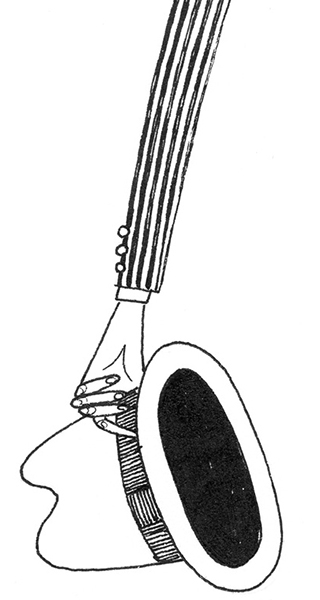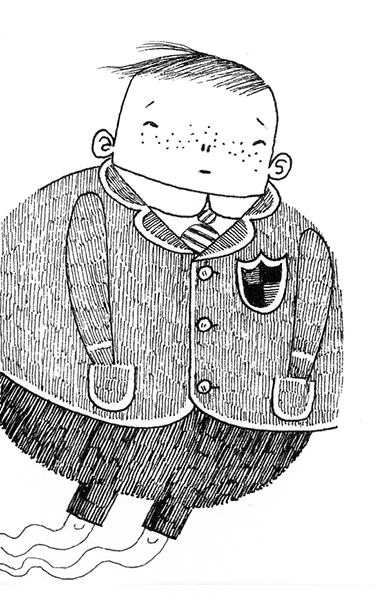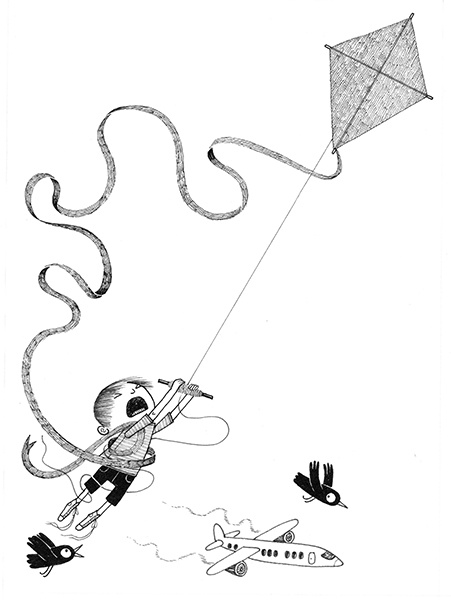School of Meanies (3 page)


Charlie’s Polite Advice
Still-Alive School wasn’t like our old gray Ghost School. The building was built from red bricks and had a roof as flat and boring as a math book.
When we arrived, the still-alive children screamed at us and ran into the classrooms. The sun shone so brightly on the windows that I couldn’t see in, but I knew the children were inside.
“I think I’ll just float around in the playground,” I said, dragging my satchel over the railing.
“If all you do is waft around on your own,” Charlie said, “you might as well have stayed in your room.”
I smiled when Charlie said this. “If we leave now,” I said, “we can be home in a float, a wisp, and a flit.”
“That’s not what I meant. School is about more than just the written word, Humphrey.”
“What is it about, then?”
Charlie held his hat to his chest and frowned in thought. “School is about making girls blush behind the bike shed and beating the school bully at jacks. At least, that’s how I remember it from when I was a boy.”
“I don’t want to do those things,” I said as Charlie peered at me through the railings.
“Look,” Charlie said, pointing. “There’s
another boy who’s arrived late. If you float over and say hello, you might make a new friend.”
“He won’t like me,” I said. “I’m a ghost.”
“I’ll hold your satchel. Off you float.”
I waited until the boy opened the door to the school building, then wisped across the playground and bumped him so hard he landed on the concrete in a heap—no fibbing!
The boy scrambled to his feet and ran out through the school gates in tears.
“Humphrey!” Charlie yelled. “Why did you bump the poor lad?”
“To teach him a lesson for making fun of me.”
“But he didn’t make fun of you,” Charlie said.
“He would have, if I hadn’t bumped him.”
Charlie dragged the satchel across the playground toward me. “If you want to get
along in this world, you must learn to be polite. All it takes is a smile and a doff of the hat—”
“I don’t wear a hat.”
“Bump this door open,” Charlie said, “and I’ll show you what I mean.”
Charlie left the satchel of books on the doorstep and led me along a corridor lined with shiny red doors. From behind one of the doors, we could hear a lady teacher droning on about addition.
“Watch,” Charlie said with a wink, “and learn.”
“Learning is what I’m here for,” I said with a gulp.
Charlie held his trilby to his chest—the polite thing to do—and passed through the wall and into the classroom.
“Forgive me for interrupting,” I heard him say, but before he could finish, the teacher
shrieked at the top of her lungs and the still-alive children made the most frightful commotion.

“Not quite the reaction I expected,” Charlie said, passing back.
I pulled a chocolate biscuit from my trouser pocket and took a bite. “You see? The still-alive children are meanies, just like Wither said.”

Wither’s Abysmal Poetry
That evening, Tabitha and Charlie had a grown-up talk in the study. I wisped into the clicky-clacky typewriter where I could watch and listen in secret.
“Humphrey used to be so popular,” Tabitha said, “but then he started bumping.”
“He’s always bumped,” Charlie said, adjusting his trilby, “ever since he was a still-alive.”
“I doubt he bumped as much as he does now, Charlie.”
“I’ve tried talking to the boy,” Charlie said, “but I can’t get through to him.”
At that moment Wither wisped in. “I have it!” he cried, wriggling his candlestick fingers.
“Calm down, Wither,” Tabitha said. “Take a deep breath and tell us your idea.”
Wither took a deep breath, but when he spoke he sounded more excited than ever. “It is as easy as algebra. If we do the still-alive pupils a good deed, they will look upon us ghosties with kindness and embrace Master Bump as a friend.”
“What do you have in mind?” Charlie said. “If there is one thing children love,” Wither said with a smile, “it is vegetables. And if there is one other thing children love, it is poetry.”
Charlie adjusted his tie. “Oh, I don’t know about that.”
“Tell us your plan,” said Tabitha, sounding deadly kind.
“I will compose a vegetable-themed poem,” Wither announced in his warbly poetry voice, “and recite it to the children during their English class.”
A moment later, Wither’s fingers floated above the keys, so I wisped out of the clicky-clacky typewriter. I wanted to stay as far away from Wither’s poetry as possible.
“Humphrey!” Tabitha said. “You’ve been listening all this time.”
“Please don’t let Wither write a poem about vegetables,” I said, trying not to blub. “I hate vegetables, and Wither’s poems are drivel.”
“Don’t be mean,” said Wither.
“If Wither reads his poems at the school,” I said, “the still-alive children will hate us ghosties more than ever.”
“Dear boy,” Wither said, “you lack faith.”
He fed a sheet of paper into the clicky-clacky typewriter and began to type.
During the night, I could hear the
click-clack
of keys, and Wither wailing poetically into the darkness. “Oh, the muse!” he wailed. “Oh, the muse!”
When I floated into the study after breakfast, Wither lay slumped over the clicky-clacky typewriter. Agatha and Tabitha were trying to shake him awake.
“I barely slept a wink,” I said with a yawn. “Wither,” Tabitha said, “it’s time to float to Still-Alive School and recite the poem.”
“I’m too tired to recite the, um, carrot,” Wither mumbled, prying his eyes open with his bony fingers.
“But, Wither,” Agatha said, “you’ve been working on that poem all night. It would be a shame not to recite it.”
“Wake me when I’m broccoli,” Wither said, and his haunted head flopped against the keys.
“Why did the poem take so long to write?” Tabitha asked Wither, shaking his left shoulder. “Is it a particularly good poem?”
“It is more that it’s a particularly long poem,” Wither yawned, scooping up a pile of papers. “A twelve-thousand-page poetic epic. Come along, Humphrey. We have young minds to nurture.”
The float to school took forever. Wither kept nodding off, and every few seconds a page would sail away on the warm summer breeze and Tabitha would chase after it.

“He’s fading,” I whispered to
Tabitha as the three of us wafted by the school gates.
“Wither,” Tabitha said, “you’re so tired you’ve turned transparent.”

“All ghosties are transparent,” Wither yawned.
“Not as transparent as that,” Tabitha said, “and not all over. You’re so see-through you’re barely visible. Why not float home and get some sleep?”
Wither shrugged and watched lazily as
twelve thousand sheets of paper blew across the playground. “I will have to recite my masterpiece from memory.”
The three of us flitted around the school building until we found a classroom with an open window. Inside, we could hear a lady teacher rattling on about verbs and nouns.
Wither was so tired now we could barely see him at all.
“I’ll just write the poem on the blackboard, then float off home to bed,” Wither yawned, and he wisped into the classroom.
“I doubt they’ll have enough chalk,” Tabitha giggled.
Tabitha and me wisped into a plant pot on the windowsill and waited.
A moment later a piece of chalk from the teacher’s desk and scrawled the words ODE TO VEGETABLES on the blackboard.
The teacher fainted, and the still-alive children leapt from their seats and screamed.
“At least wait until I’ve written the first line,” Wither’s voice said, “before you pass judgment.”
But the still-alive children were already scrambling over their desks and barging out through the classroom door.

Agatha’s Helpful Breeze
Tabitha said I could spend the rest of the week at home, reading comic books. Well, literature really, but I’d torn up my comics and hidden the pieces between the pages of Wither’s books.
The comics didn’t make much sense jumbled up like that, but they still made more sense than Dickens.
On Saturday, me, Tabitha, Agatha and Wither floated down to the village park.
“The still-alive children will yell mean names and run away,” I said.
“I doubt they’ll be able to see us in this bright sunlight,” Agatha said.
The park was deadly busy, with families seated on tartan blankets scarfing down sandwiches from paper plates and dogs chasing sticks and nannies pushing baby still-alives in strollers.
“Look at the children on the hill there,” Wither said, pointing. “They’re trying to fly kites, but there’s no wind.”
“We can’t have that,” Tabitha said. “Aggie, you could create a breeze using your skills.”
“Tabitha, dearest,” Agatha said, clutching her pearls, “with my limited abilities, I doubt I could blow the froth from a mug of coffee.”
“Modesty has its place, dear Aggie,” Wither said, “but the boy here needs an education.”
All ghostly eyes turned to me.
“Wither,” Agatha said, “what could you possibly mean?”
“The kite problem is nothing more than an opportunity stood upon its head.”
“What are you talking about?” Tabitha said.
“It is as simple as sums,” Wither said, and he waved his fingers like sticks of Frighten rock. “What if Agatha were to rustle up a force-ten gale as Tabitha suggests? The still-alive children will adore us ghosties after that, the Bump boy included.”
“Me? A force-ten gale?” Agatha said with a blustery laugh. “I can barely blow the seeds from a dandelion.”
“Rubbish,” Tabitha said. “We’ve all seen the way you dry Wither’s long johns.”
Wither folded his coat-hanger arms. “Agatha, the educational diet of a hungry mind is at stake.”
“My mind is the only part of me that isn’t hungry,” I said. “Anyway, what’s the point in helping the still-alives? They’ll only be mean to me.”
“No one is mean in the park on a Saturday,” Wither said. “Not even the still-alive children are mean in the park on a Saturday.”
“Well, I think the plan is rotten,” I said as the four of us floated up the hillside. “I wouldn’t mind flying a kite though.”
Agatha raised a posh eyebrow at a girl holding a floppy kite. “Now, there’s a young lady who’d appreciate a gust or two.”
“Off you float then,” Tabitha said.
For a moment Agatha looked ready to flit into action, but then she shrugged, rolled her eyes, rattled her pearls, and said, “I can’t do it with you three watching.”
“We’ll turn the other way,” Wither said, and we did.
But then we turned back.
The three of us watched as Agatha wisped around the girl in a circle, once, twice, again and again and again, faster and faster, until the kite broke free of the girl’s arms and lifted into the air.
“Good old Aggie!” Tabitha cried, clapping her hands.
“But she’s doing it wrong,” I said. “Look.”
Tabitha yelled at Agatha to stop, but it was too late. The kite began to spin, and the string twisted this way and that and coiled around the girl like a snake.
“Help!” the girl cried as her mother and father ran to the rescue. “Help!”
“Stand still,” the father called, but the girl lost her balance and rolled down the hill.
“Never mind,” Tabitha said when Agatha floated back. “Try again.” She squinted into the sun and pointed toward the very top of the hill. “What about that boy there?”
The four of us floated up the hillside to where a tiny boy raced through the long grass, an orange kite held high above his head.
“A bit less around-and-around,” Agatha said to herself, “and a lot more up-and-up.”
“We’ll turn the other way,” I said, and we did.
But then we turned back.
“There she blows!” Tabitha said. “Good old Aggie.”
The three of us watched open-mouthed as the orange kite soared high into the bright blue sky.
“Isn’t Agatha wisping a bit fast?” I said.
“You’re right,” Wither said. “The poor still-alive is struggling to keep up.”
Tabitha gasped as the boy’s sneakers lifted from the ground. Up and up he went, gripping the wooden reel with his fingers.
“The kite is carrying him away,” I said. “Why doesn’t he let go?”
“It’s too late for that,” Wither said. “If he hits the ground from that height, he’ll turn into one of us.”
The other still-alives stopped scarfing sandwiches and pushing strollers and throwing sticks for dogs, and ran after the terrified, tiny boy. Perhaps they thought they’d be able to catch him if he let go of the reel.
“Help!” the boy cried. “Help! Help!”
“We have to get him down!” one of the still-alives yelled.
“He’ll bump his head on an airplane!” yelled another.
“And what if he’s pecked by birds!” yelled another.
Whenever the boy bobbed beneath the clouds, the still-alives ran toward him, but then he’d disappear out of sight and reappear somewhere else, and the still-alives would have to run in a different direction.

Then a gust of wind sent the boy sailing off to the east, and the still-alives ran out through the park gates, dogs yapping at their heels.
We floated around for a bit, then Agatha said, “We might as well enjoy ourselves, while we’re here.” And she wisped off over the hill.
“Where’s she gone?” I said, and Wither and Tabitha shrugged.
When Agatha floated back a minute later, she held four ghostly raspberry-ripple I-screams.
“Good old Aggie,” Tabitha said, and we gave our I-screams a joyful lick.
As we floated home through the village later that afternoon, we came across a crowd of still-alives gathered on the sidewalk by the church.
“Today must be Sunday,” Wither said.
“It can’t be,” Tabitha said. “It was Saturday when we left the house.”
We floated closer. The still-alives were gaping
at a boy bound to the church spire, an orange kite dangling from his ankle.
Several newspaper reporters were taking photographs and scrawling in their notepads. A policeman propped a ladder against the church wall, but it barely reached the roof.
Two minutes later, the crowd parted as a fire engine roared down the street, sounding its siren.
“What a brave little boy,” Agatha said, and we wisped toward home.
